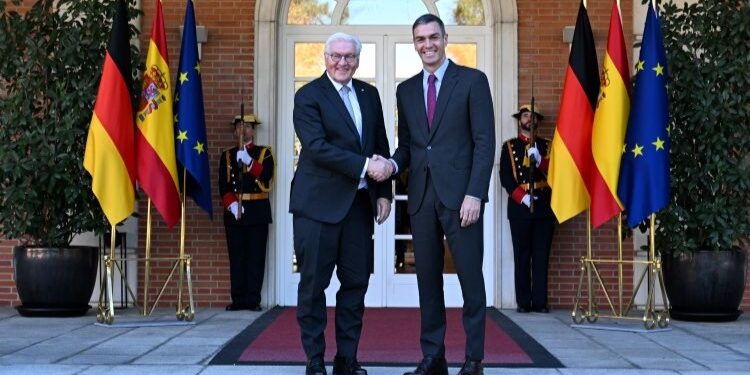Eduardo González
The President of the Government, Pedro Sánchez, received the President of the Federal Republic of Germany, Frank-Walter Steinmeier, on Thursday, November 27th. Among other issues, they discussed bilateral economic cooperation, with particular attention to the defense industry.
Sánchez and Steinmeier held a bilateral meeting at the Moncloa Palace during the second day of the German leader’s state visit to Spain. According to a press release from the Prime Minister’s Office, the two leaders discussed bilateral relations, economic cooperation between the two countries, energy interconnections, the defense industry, the climate agenda, the fight against extremism, democratic memory, the geopolitical situation, and the conflicts in Ukraine and the Middle East.
During the meeting, Pedro Sánchez affirmed that Germany is an essential economic partner for Spain, as it is its second largest customer, its main supplier, and one of the primary sources of foreign direct investment.
He also pledged to continue exploring new opportunities for collaboration in strategic sectors and within the framework of European and multinational programs, and highlighted Spain’s reliability as a strategic partner in the defense industry. In this regard, the Prime Minister stated that the increase in German defense production opens new opportunities for leading Spanish companies, capable of contributing to strengthening shared industrial capacity.
Regarding democratic memory, Sánchez thanked the German President for his upcoming visit to Gernika, a gesture of “enormous symbolic power” to honor the memory and reinforce shared democratic values, and acknowledged Germany’s commitment to a culture of remembrance. Furthermore, both leaders shared their concern about the rise of extremism in Europe and emphasized the importance of democratic forces acting in unity and with constructive solutions to protect European values.
For his part, Frank-Walter Steinmeier stated that “German-Spanish relations are as close and trusting as they have always been.” “We intend to grow even closer in the future,” he added, as quoted by the German Presidency.
This is the first state visit by a German president to Spain since 2002. It is also Frank-Walter Steinmeier’s second visit to Spain since taking office in March 2017, but his first, which took place at the end of October 2018 on the occasion of the German-Spanish Forum, was an “official visit,” not a “state visit.”
Spanish-German Forum
The second day of the State Visit began with the 11th Spanish-German Forum, held at the CEOE headquarters in Madrid under the theme “Germany and Spain: Towards a More Competitive and Resilient European Economy,” and chaired by King Felipe VI and President Frank-Walter Steinmeier.
The meeting, which has been held alternately in Madrid and Berlin since 2002, brought together government and business representatives from both countries, including the State Secretary for Industry, Jordi García Brustenga; the State Secretary for Trade, Amparo López Senovilla; the German State Secretary for Digital Transformation and Government Modernization, Thomas Jarzombek; the President of the CEOE, Antonio Garamendi; the President of the Spanish Chamber of Commerce, José Luis Bonet; the Director General of the Federation of German Industries (BDI), Tanja Gönner; and the President of the German Chamber of Commerce in Spain and CEO of T-Systems Iberia, Osmar Polo.
During his address, the King recalled that, since the previous edition of the Forum (held in Berlin in 2022), the global geopolitical landscape has become, “if possible, even more complex,” because, “to the previous challenges have been added new trade tensions, protectionist threats, and an international political environment marked by uncertainty and the persistence of regional conflicts,” he lamented.
“Spain and Germany have been loyal partners for a long time. We share democratic values, a commitment to Europe, and similar challenges and potential for collaboration in the economic sphere. Our bilateral economic relations are characterized by the high intensity of trade and investment flows,” the Monarch affirmed.
In this context, he stated, the two countries have “the opportunity and the responsibility to promote policies aimed at improving the competitiveness and autonomy of the EU and establishing a true European single market.”
For his part, Steinmeier highlighted the “close cooperation between Spain and Germany” in “these difficult times, when the rules-based world order and also the world economic order are under pressure.”
“We are currently experiencing a double rupture: with the war of aggression against Ukraine, Russian President Putin has deliberately destroyed the European security architecture, with long-term consequences for all of us,” he stated. Furthermore, “our close transatlantic partner, the United States, is simultaneously calling into question the values of a global order in which it has played such a decisive role in defining it,” he added.
“Europe must resist this pressure, and we must do something to counter it. That is why it is crucial that Europe be secure, competitive, and resilient, that we innovate while protecting what is important to us,” he warned. “Justice, open competition, reliability, trust: all of these have brought peace and prosperity to European countries. Let us preserve these principles and give them new life, so that our children and grandchildren can also live in peace and prosperity throughout Europe,” he continued.
Trip to the Basque Country
On Friday, Frank-Walter Steinmeier and his wife will continue their agenda in the Basque Country, where the German president will be received in Vitoria by the Lehendakari (President of the Basque Government), Imanol Pradales. Following this, the German leader will travel to Gernika to pay tribute to the victims of the 1937 bombing, an act with strong symbolic significance as he will become the first German president to visit the Basque town since it was devastated by the Condor Legion.






